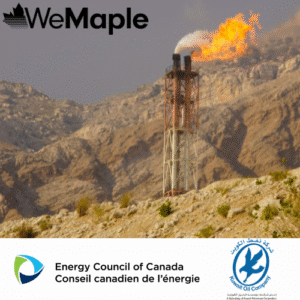The Energy Council of Canada has announced a new opportunity for Canadian innovators to partner with the Kuwait Oil Company (KOC) on upstream technology challenges — a rare invitation that underscores Kuwait’s commitment to global collaboration in oil and gas innovation.
KOC’s Innovation and Technology Group has published a detailed framework of focus areas, ranging from reservoir characterization and drilling optimization to digitization, AI, and sustainability. These include frontier challenges like fluid flow modeling, formation evaluation, well integrity, automation, and water management — domains where Canadian expertise is globally recognized.
Kuwait’s approach reflects a shift in the Middle East’s energy narrative: local operators are now sourcing global technology partners to accelerate decarbonization and data-driven efficiency across assets. This aligns with a broader Gulf Cooperation Council (GCC) trend — combining traditional energy strength with next-generation digital and sustainability infrastructure.
Canadian firms engaged in artificial intelligence, big data analytics, and advanced geosciences are being encouraged to contact Raed Bishara, Trade Commissioner at the Embassy of Canada in Kuwait, to explore partnership pathways.
At its core, this initiative signals more than an R&D collaboration — it’s an early step toward a global energy-tech consortium model, where cross-border co-innovation replaces siloed competition.
Canada’s Energy Tech Advantage Meets Gulf Vision 2030
This partnership invitation comes at a strategic inflection point. Kuwait’s National Development Plan 2035 prioritizes economic diversification and technological advancement, while Canada’s energy sector has evolved into one of the world’s most sophisticated clean-tech ecosystems.
Canadian companies bring proven expertise in enhanced oil recovery, carbon capture utilization and storage (CCUS), and AI-driven reservoir management — technologies that directly address KOC’s operational priorities. The timing aligns with Kuwait’s broader push to optimize existing hydrocarbon assets while building infrastructure for energy transition.
The focus areas outlined by KOC read like a roadmap of Canadian energy innovation strengths: from Calgary’s drilling optimization specialists to Toronto’s AI companies, from Vancouver’s geothermal expertise to Montreal’s advanced materials research.
Beyond Oil: The Digital Infrastructure Play
What makes this collaboration particularly compelling is the convergence of traditional energy operations with next-generation digital infrastructure. KOC’s emphasis on digitization and AI reflects a recognition that future energy competitiveness depends as much on data analytics as geological expertise.
Canadian firms specializing in edge computing, industrial IoT, and machine learning for harsh environments are positioned to address challenges that extend beyond Kuwait’s borders. Solutions developed for Kuwait’s desert operations could scale across similar environments in Saudi Arabia, the UAE, and beyond.
The water management focus area deserves particular attention. Kuwait faces some of the world’s most severe water scarcity challenges, creating demand for Canadian expertise in water recycling, desalination optimization, and integrated water-energy systems.
Strategic Implications for Energy Diplomacy
This initiative represents more than bilateral trade — it’s energy diplomacy reimagined for a multipolar world. Rather than competing for market access, Canada and Kuwait are co-creating technological solutions that could reshape global energy operations.
The model has precedent in Canada’s successful partnerships with Norway on offshore technology and with Denmark on wind energy systems. But the Kuwait collaboration operates at a different scale, potentially influencing energy operations across the entire GCC region.
For Canadian companies, the opportunity extends beyond immediate project revenues. Partnership with KOC provides validation for technologies that could then scale to other Gulf operators, creating a multiplier effect for successful collaborations.
The Geothermal Connection
Particularly intriguing is the potential for geothermal applications within this partnership framework. Kuwait’s subsurface geological data from decades of oil exploration provides a foundation for geothermal resource assessment — an area where Canadian expertise in enhanced geothermal systems could prove transformative.
Recent advances in closed-loop geothermal technology, pioneered by Canadian companies, could enable geothermal development in regions previously considered unsuitable. Kuwait’s high cooling demand and existing energy infrastructure make it an ideal testing ground for integrated geothermal-conventional energy systems.
Implementation Pathways and Market Access
The Embassy of Canada’s direct facilitation through Trade Commissioner Raed Bishara signals government-level commitment to making these partnerships succeed. This diplomatic backing reduces typical market entry barriers and provides institutional support for complex technology transfer agreements.
Canadian firms should expect a structured evaluation process focused on technological readiness, local adaptation capabilities, and long-term partnership potential. KOC’s approach emphasizes sustained collaboration over one-time technology sales.
The partnership model likely includes provisions for local knowledge transfer, joint research initiatives, and potential co-development of intellectual property — creating deeper strategic relationships than traditional vendor-client arrangements.
Broader GCC Market Implications
Success in Kuwait opens doors across the GCC. The region’s energy operators maintain close technical collaboration, meaning proven technologies often see rapid adoption across multiple markets. Canadian firms establishing credibility with KOC position themselves for similar opportunities with Saudi Aramco, ADNOC, and other regional giants.
The timing coincides with unprecedented GCC investment in energy transition technologies. The region’s sovereign wealth funds are actively seeking proven clean-tech solutions, creating potential for partnership models that extend from operational collaboration to strategic investment.
The Future of Energy Innovation Diplomacy
Kuwait’s invitation to Canadian firms represents a new model for international energy cooperation — one based on technological complementarity rather than resource competition. As global energy systems become increasingly complex and interconnected, such partnerships may become the norm rather than the exception.
For Canada, this collaboration validates the country’s evolution from energy supplier to energy technology leader. For Kuwait, it demonstrates commitment to remaining relevant in a rapidly changing global energy landscape.
The success of this initiative will be measured not just in immediate project outcomes, but in its potential to establish a template for similar collaborations worldwide. In an era of energy transition, the countries that build the strongest innovation partnerships may well determine the future of global energy systems.
Canadian companies interested in exploring partnership opportunities with the Kuwait Oil Company should contact Raed Bishara, Trade Commissioner at the Embassy of Canada in Kuwait, for detailed information on application processes and technical requirements.
#CreativeIntelligence #EnergyInnovation #CanadaToKuwait #Geothermal #DataDrivenEnergy #BOCAI

